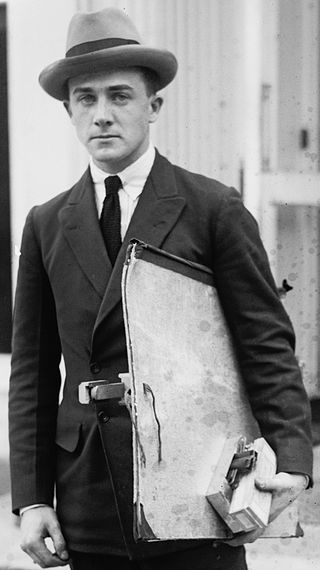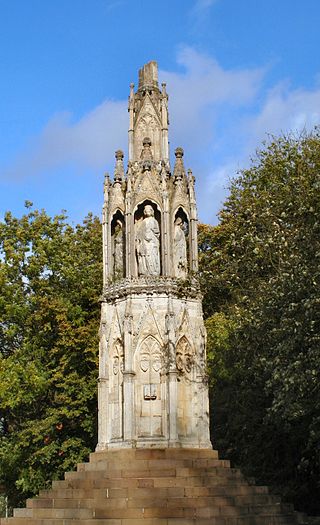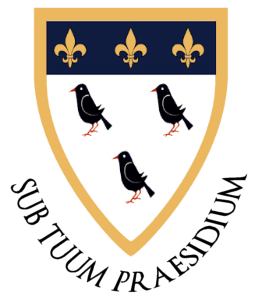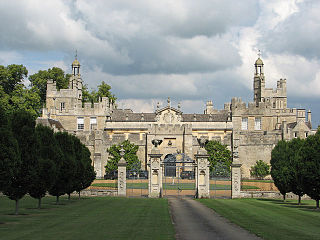
Ivan Simon Cary Elwes is an English actor. He starred as Westley in The Princess Bride (1987), and also had lead roles in films such as Robin Hood: Men in Tights (1993) and the Saw series. The accolades he has received include nominations for a Screen Actors Guild Award and two Satellite Awards. Elwes' other performances in films include Glory (1989), Days of Thunder (1990), Hot Shots! (1991), Bram Stoker's Dracula (1992), Twister (1996), Kiss the Girls (1997), Liar Liar (1997), Shadow of the Vampire (2000), The Cat's Meow (2001), Ella Enchanted (2004), Pope John Paul II (2005), No Strings Attached (2011), BlackBerry, and Mission: Impossible – Dead Reckoning Part One (2023).
The Bishop of Northampton is the Ordinary of the Roman Catholic Diocese of Northampton in the Province of Westminster, England.

Weston Favell is an area and former civil parish near the eastern end of Northampton, now in the parish of Northampton, in the West Northamptonshire district, in the ceremonial county of Northamptonshire, England.

Elsham Hall is a 17th-century English country house situated in its own parkland in Elsham, North Lincolnshire. The park and gardens are open to the public.

Billing is a civil parish in eastern Northampton, in the West Northamptonshire district, in the ceremonial county of Northamptonshire, England. It covers the Great Billing, Little Billing, Ecton Brook and Bellinge areas. It is geographically the largest area of Northampton. According to the 2001 census the parish had a population of 8,642, decreasing at the 2011 census to 8,457. Billing consists of four estates, with each estate constituting a ward of the parish. Great Billing and Little Billing were developed around the existing villages; Bellinge and Ecton Brook were created as new communities. Billing is accessible by the A45 westward to Northampton which runs along the south side of Billing and is accessed through the Lumbertubs Way Interchange.
Bede Evelyn Dominick Elwes was an English portrait painter whose much publicised elopement with an heiress in 1957 created an international scandal.

Lt. Col. Simon Edmund Vincent Paul Elwes, was a British war artist and society portrait painter whose patrons included presidents, kings, queens, statesmen, sportsmen, prominent social figures and many members of the British Royal Family. He was a favorite of Queen Elizabeth The Queen Mother.
Dom Columba Cary-Elwes, OSB was an English Benedictine monk who professed vows at Ampleforth Abbey in York, England. As a missionary he travelled to Uganda, Tanzania and Kenya and has written books on Christianity. He was the founding prior of the Priory of Saints Louis and Mary in Saint Louis, Missouri.

Gervase Henry Cary-Elwes, DL, better known as Gervase Elwes, was an English tenor of great distinction, who exercised a powerful influence over the development of English music from the early 1900s up until his death in 1921 due to a railroad accident in Boston at the height of his career.

Hardingstone is a village in Northamptonshire, England. It is on the southern edge of Northampton, and now forms a suburb of the town. It is about 1 mile (2 km) from the town centre. The Newport Pagnell road separates the village from the nearby village of Wootton, which has also been absorbed into the urban area.

Great Harrowden is a village and civil parish in North Northamptonshire, with a population at the 2011 census of 161. The village is located near the A509 road running between Kettering and Wellingborough. The village formed part of the Orlingbury hundred and the Borough of Wellingborough. Since 2021 it has been within North Northamptonshire unitary authority.

The Diocese of Northampton is a Latin Church diocese of the Catholic church in England and Wales and suffragan of Westminster. Its see is in Northampton. The Cathedral of Our Lady Immaculate and St Thomas of Canterbury is the mother church of the Diocese.

John Coates was a leading English tenor, who sang in opera and oratorio and on the concert platform. His repertoire ranged from Bach and Purcell to contemporary works, and embraced the major heldentenor roles in Richard Wagner's operas. For more than 40 years, with only a four-year interruption for military service during World War I, he overcame the limitations of a voice that was not naturally large by impressing listeners with his intense artistic expression, lively diction, musical versatility and memorable stage presence.
Frederick B. Kiddle was a prominent English pianist, organist and accompanist.
Dudley Charles Cary-Elwes was Roman Catholic prelate who served as the Bishop of Northampton from 1921 to 1932.

Castle Ashby, often Castle Ashby House is a country house at Castle Ashby, Northamptonshire, England. It is one of the seats of the Marquess of Northampton. The house, church, formal gardens and landscaped park are Grade I listed.

Drayton House is a Grade I listed country house of many periods 1 mile (1.6 km) south-west of the village of Lowick, Northamptonshire, England.

Sir Richard Everard Augustine Elwes, OBE, TD was an English barrister and High Court judge.

Egton Manor is an historic country house near the village of Egton Bridge, on the banks of the River Esk in the North Yorkshire Moors. The Grade II listed building was built in 1869 by the Foster family, whose descendants still live there today. Egton Manor, which is listed in the Domesday Book, lies at the heart of the 6,000 acre Egton Estate.

Our Lady of Perpetual Succour Church or Our Lady's Church is a Roman Catholic parish church in Great Billing, Northamptonshire, England. It was built in 1878 and founded by the descendants of John Elwes at Billing Hall in the Romanesque Revival style. It is located on the High Street in Billing. Since 2006, it has been the Diocesan Shrine to Our Lady of Perpetual Succour.














